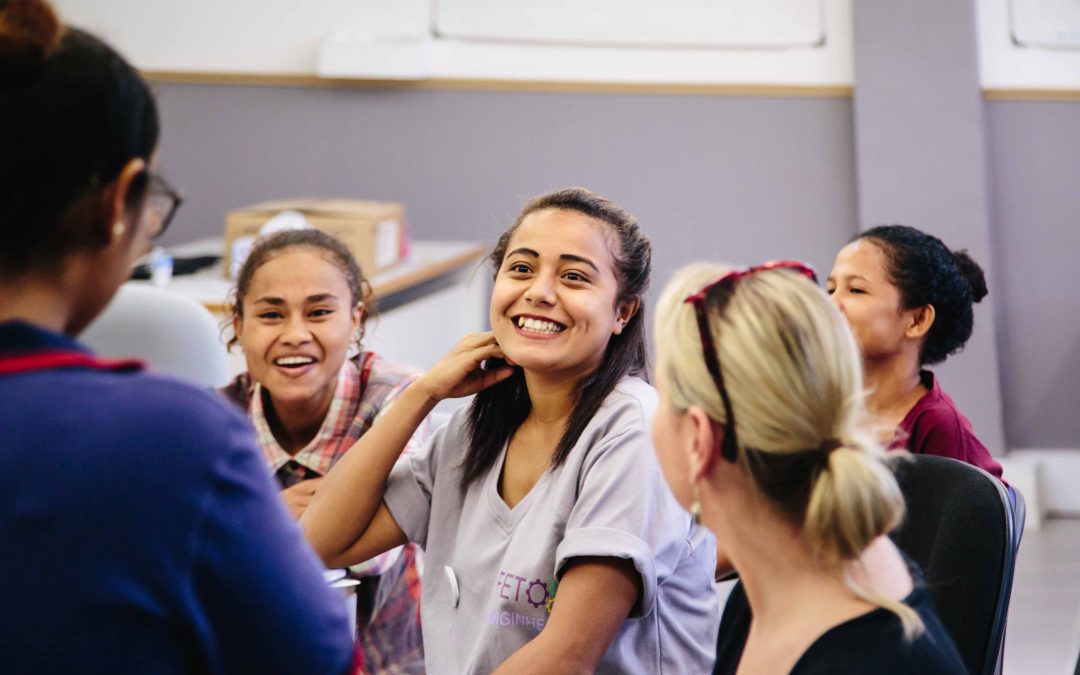Have you been considering the challenges COVID-19 has placed on women, children, and other vulnerable members of our community? EWB’s Women in Engineering (Feto Enginerha) team in Timor-Leste, joined by staff from Australia, Vanuatu, and Cambodia, certainly has!
In March EWB staff formed a group organically through a shared need to connect, and take action. The objectives that come out of this were:
- highlight intersectional issues, related to COVID-19 and impacting women;
- share knowledge of experiences or observations;
- identify actions to support communities and lessen the impact.
Meeting fortnightly, the group explores the different challenges and opportunities observed and experienced in their different contexts and situations. While there are many differences, the hardships are similar.
For example, the struggle of educating children at home when parents had not completed their own education; or students being left behind because they don’t have access to technology like laptops or internet; or workers laid off, like Cambodian garment workers or those working in manufacturing in Australia, who suddenly can’t afford to pay their children’s’ school fees.
In many countries pregnant women, too afraid or not allowed to visit the hospital for their checkups, for fear of contracting the virus. Families in Australia couldn’t access medication because they had sold out, while families in Timor-Leste couldn’t access medication because many couldn’t afford them. The more the group talked, the more they understood how adversely the impact was being felt by women and other vulnerable groups across many different communities.
The discussions delved into the complexities of why this was happening, and how we could think about influencing change. The group explored if critical decisions were made differently, could the decisions result in different outcomes, and examined any connectivity to whether it was men or women making those decisions.
One of the factors identified included limited participation and inclusion of women in decision making, looking globally but also locally for concrete actions that could be taken. They agreed that they could empower and influence those around them, primarily by: supporting and promoting women, connecting women to opportunities, complementing rather than competing, and creating platforms and inviting people who ordinarily are not heard from to have their say.
The group also examined the opportunities and benefits arising from the COVID-19 situation, such as more local community connection including bartering amongst neighbours; workplaces adapting and creating more flexible working conditions for employees with different needs and circumstances; fathers gaining an appreciation for the effort required to balance homeschooling, childcare and domestic duties with professional careers.
The beauty of all of this has been not only the exploration of these deep and pertinent topics but also the connection with one another; the sense-making through dialogue during the unfamiliar situation we are all faced with; the growth and empowerment we get from being encouraged by our peers; and having a safe space to do all of this, across four countries and many different home offices!
It’s really clear, just from these meetings let alone all the evidence that exists, that immediate steps are needed to ensure that COVID-19 does not reverse the gender equality progress achieved in recent decades, in particular with regard to women’s participation in the labour force and in leadership roles. Decisions now will have tangible impacts later.
EWB strongly encourages any individuals with whom this resonates to reach out to your like-minded allies and mobilise. Because if we collectively keep a spotlight on this issue, there’s a better chance that responses to the crisis embed a gender lens and account for women’s unique needs, responsibilities and perspectives.


